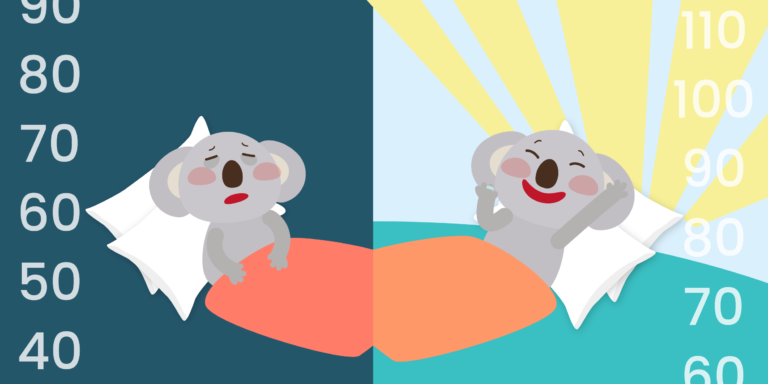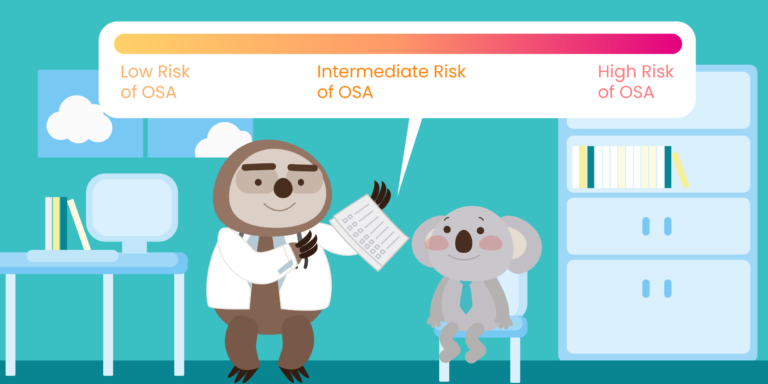Can Sleep Apnea Kill You?
More than 936 million people are impacted by sleep apnea worldwide, and approximately 30 million people suffer from sleep apnea in the US itself. As sleep apnea is an underlying medical issue for so many people, most of the patients who just got diagnosed with sleep apnea would start to question whether or not sleep apnea is deadly.
Sleep apnea may cause short pauses in breathing during sleep, but it is very unlikely to cause immediate death. Before you start worrying that sleep apnea may kill you, let’s learn about sleep apnea together.
Let’s break down exactly how life-threatening sleep apnea is and find out how it will affect your life!
What is Sleep Apnea?
Sleep apnea is a sleeping disorder in which breathing occasionally stops and restarts during sleep. Sleep apnea patients will be woken up many times during sleep. This may prevent you to have good quality of deep sleep and feel tired upon waking up. You may not realize that you have sleep apnea just yet, but if your partner tells you that you are snoring, you may be at risk of having sleep apnea.
Types of Sleep Apnea: What is obstructive sleep apnea?
Sleep apnea symptoms vary for every person, and here are three types of sleep apnea that people should be aware of:
- Obstructive sleep apnea: Throat muscles relax too much, causing the airway to narrow or close as you breathe in. This causes you to not get enough air during sleep.
Obstructive sleep apnea (OSA) is the most common sleep apnea type that causes you to gasp, choke, snore and snort during sleep. These episodes may repeat from 5, 30, or even more each hour, causing you not to be able to reach deep sleep every night. - Central sleep apnea: Central sleep apnea is more related to brain activity. The brain stem doesn’t proper signals to the muscles that control breathing during sleep. This triggers CSA to happen and causes repeated slower and shallower breathing.
- Complex sleep apnea: This type of sleep apnea occurs in someone with both obstructive and central sleep apnea symptoms. In another term, it is also known as treatment-emergent central sleep apnea.
The severity of sleep apnea
Obstructive sleep apnea comes with different levels of severity, which are:
- Severe obstructive sleep apnea: Apnea-hypopnea index (AHI) is greater than 30 episodes an hour.
- Moderate obstructive sleep apnea: AHI is between 15 to 30 episodes an hour.
- Mild obstructive sleep apnea: AHI is between 5 to 15 episodes an hour.
How serious is mild sleep apnea?
Whenever you are diagnosed with severe or moderate obstructive sleep apnea, it is important to seek treatment as soon as possible. Meanwhile, mild sleep apnea may cause some health issues after a long-term period. It is important to discuss with the sleep physician how to manage mild sleep apnea symptoms or what lifestyle changes you can make.
Signs of Sleep Apnea
Many people may not realize they have not been sleeping well or that they have sleep apnea. You may only realize it when your partner reports that you are snoring or gasping during your sleep. To find out whether you really have sleep apnea, here are some symptoms of sleep apnea you may need to be worried of:
- Feeling tired after a whole night of sleep
- Waking up with a dry mouth
- Having morning headaches
- Feeling excessively tired in the daytime (hypersomnia)
- Having difficulty staying asleep during the night
- Getting chest pain at night
- Lacking concentration in the morning
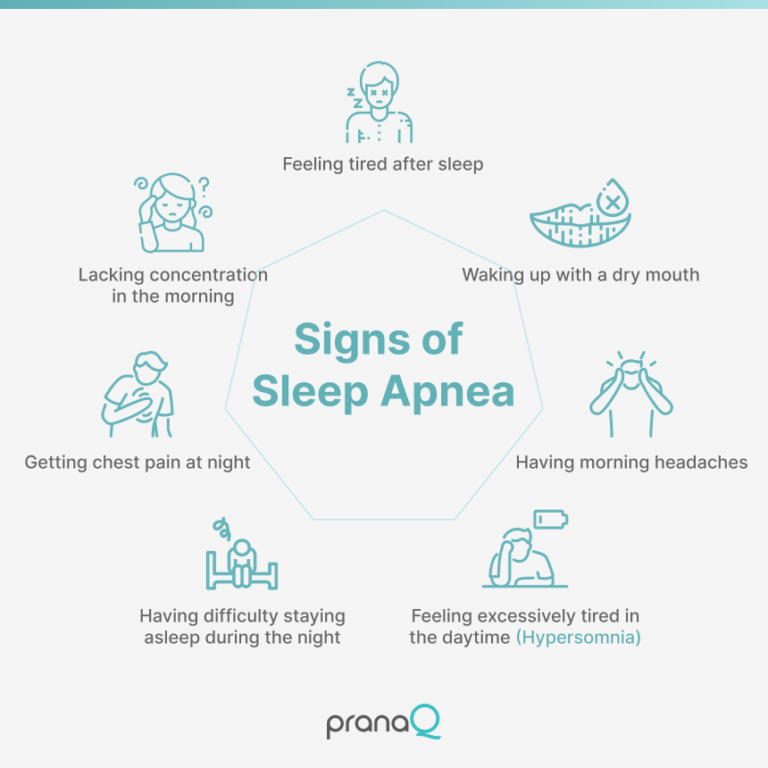
How can Sleep Apnea kill you?
Sleep Apnea is highly unlikely to kill you suddenly during your sleep. However, severe sleep apnea can be deadly when accounting for the deadly health conditions it is known to aggravate. There are many risk factors of sleep apnea you may unknowingly have.
Risk factors of Sleep Apnea: How serious is Sleep Apnea?
Sleep apnea is not only limited to age or weight, but you are more prone to sleep apnea if you are older or heavier. Here are some short-term risks and chronic risks factors of sleep apnea you should be aware of if you think you have sleep apnea:
- Overweight
- Larger neck circumference
- Narrowed airway
- Being older
- Family history of sleep apnea
- Often consume alcohol, sedatives, or tranquilizers
- Smoking
- Have allergies
- Own certain pre-existing medical conditions
- Men in general
- Women who start menopause
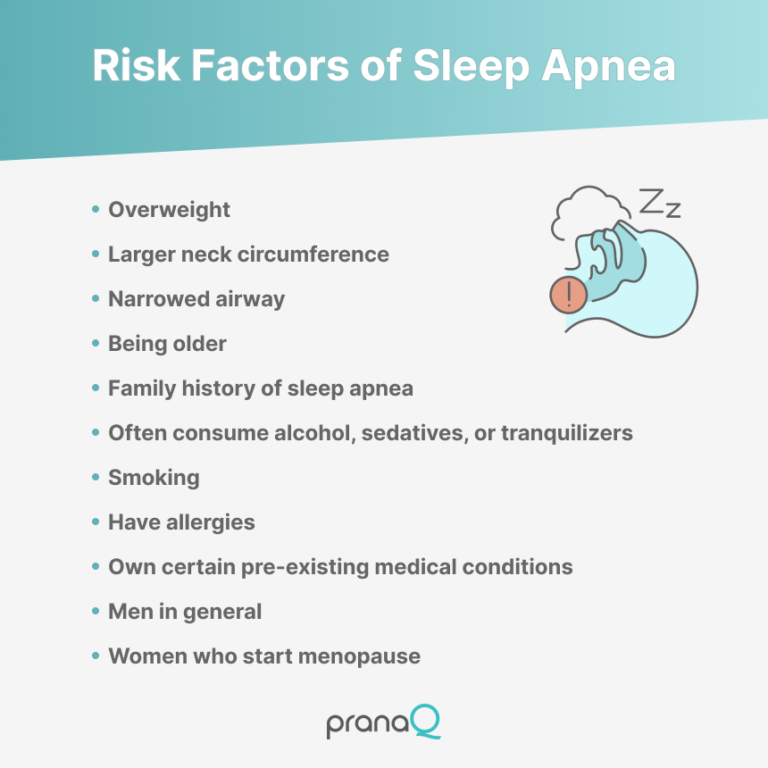
Will Sleep Apnea Kill you?
The most important question on your mind right now is: “Will sleep apnea kill you?”
As we have discussed before, sleep apnea will not kill you outright, no matter if it is severe sleep apnea, moderate sleep apnea, or even mild sleep apnea. However, if sleep apnea is left untreated, it can worsen other preexisting health conditions that may be deadly.
Can sleep apnea be deadly without treatment?
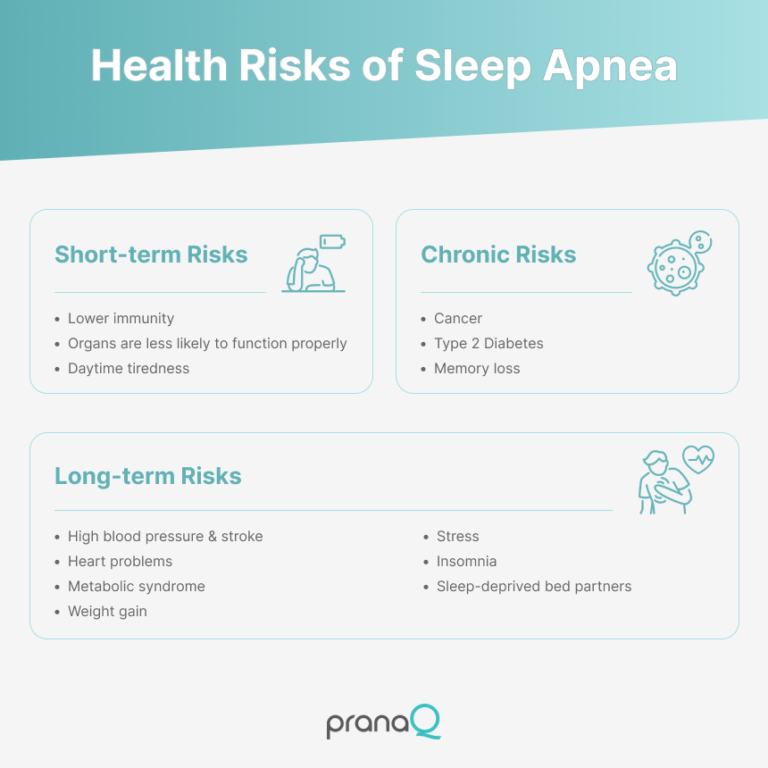
Sleep apnea may cause serious health problems that eventually affect life if it is left without treatment. Unstable breathing during untreated sleep apnea may cause certain health problems for the body short-term and long-term.
Will sleep apnea kill you immediately during sleep? There is a very small chance that sleep apnea will kill you, but sleep apnea may lead to certain risks you should pay attention to.
Health risks of sleep apnea
Short-term risks of sleep apnea include:
- Lower immunity: The body will have no good rest time to replenish and regenerate enough antibodies to fight infections.
- Organs are less likely to function properly: Sleep apnea causes repeated awakening throughout the night, which disrupts organs’ time to rest during the night fully
- Daytime tiredness: The patient may have difficulty concentrating at work, or often fall asleep when watching TV or even driving.
- Accidents and injuries caused by lack of concentration
Long-term risks of sleep apnea include:
- High blood pressure & stroke: Blood oxygen levels drop during sleep apnea, and it may increase blood pressure and tighten the cardiovascular system.
- Heart problems: patients are at higher risk of getting heart attacks, congestive heart failure, atrial fibrillation, insulin resistance, etc.
- Metabolic syndrome: Sleep apnea causes abnormal cholesterol levels, high blood sugar, high blood pressure, and an increased waist circumference.
- Weight gain: Sleep apnea encourages the body to release more hormone ghrelin, which makes you crave carbs and sweets. When your body is tired, you may not be able to turn any of your cravings into energy efficiently, adding up the risk of weight gain.
- Stress: Stress causes sleep apnea, but sleep apnea can also cause stress! Sleep deprivation causes the body to worry about not getting enough sleep and increase cortisol levels.
- Insomnia: Some people are scared of getting sleep apnea during sleep, so the brain registers the possibility of sleep apnea as a life-threatening issue that patients need to avoid, and this may help induce insomnia.
- Sleep-deprived bed partners: Anyone who sleeps beside you may be disturbed by the loud snoring and they may not get the good rest they need.
Chronic risks of sleep apnea include:
- Cancer: People with moderate or severe sleep apnea are 2 and a half times more likely to get cancer, and 3x more likely to die from cancer.
- Type 2 Diabetes: Sleep apnea has a higher risk of developing insulin resistance.
- Depression: Poor sleep hygiene might cause someone to have a higher chance of depression.
- Memory loss: Some older people who are sleep apnea patients report thinking problems or memory slips. This disorder is called mild cognitive impairment (MCI). Although it is not as severe as dementia, researchers found that MCI is related to “sleep-disordered breathing” like obstructive sleep apnea.
Sleep apnea is also known as a ‘silent killer’ as it may go unnoticed or people just simply would ignore it. However, if you are a sleep apnea patient or are showing symptoms of sleep apnea, it is very recommended to get tested and treated fast!
How do you test for sleep apnea?
After noticing certain sleep apnea symptoms, it is important to get diagnosed with sleep apnea properly and medically. There are two types of sleep apnea tests you can do, which are:
- Nocturnal polysomnography: Getting tested with an overnight sleep apnea test in a sleep clinic. You will be hooked up to sleep test equipment that will monitor your heart rate, breathing patterns, blood oxygen levels, lung and brain activity, and arm and leg movements while sleeping.
- At-home sleep apnea tests: Your sleep doctor will provide you with a simplified breathing monitor to bring home and get tested overnight on your own. A sleep test at home can also track your breathing, oxygen levels, and different important health parameters overnight or in a couple of nights too.
I am a nervous sleeper…
Some people have trouble sleeping outside of their bedroom or in a strange place, and you are maybe one of them! There is nothing to worry about as there is a sleep test at home you can use, like PranaQ products!
PranaQ is committed to serving you with a convenient and simplest sleep tracker to make an easy sleep test at home. You can touch upon your sleep apnea issues fast at the comfort of your place as your sleep apnea diagnosis will be sent to your sleep doctor.
Interested in PranaQ’s sleep apnea tracker? Feel free to reach out to us through our Facebook, Instagram, and LinkedIn now!





